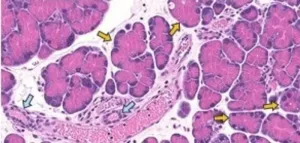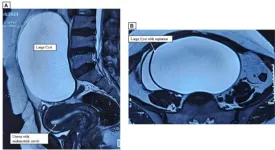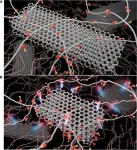(Press-News.org) FOR IMMEDIATE RELEASE
Johns Hopkins Medicine scientists say they have found a pattern of so-called epigenetic “marks” in a transition state between normal and pancreatic cancer cells in mice, and that the normal cells may keep at least a temporary “memory” of those cancer-linked marks.
Epigenetic marks are chemical modifications that help regulate genetic expression without directly altering DNA sequence in the makeup of genes. While the genetic code is like a computer’s hardware, epigenetics involves chemical marks on top of the genetic code that act as software programing in a computer.
The new research, funded by the National Institutes of Health and published online March 28 in the journal Genome Medicine, supports efforts to better understand how normal cells morph into cancer, along with the roles of inflammation and cellular damage in that process.
“Epigenetic changes have long been a focus of research seeking to explain how cells transition from normal to cancer,” says Andrew Feinberg, M.D., Bloomberg Distinguished Professor in the Johns Hopkins University schools of medicine, engineering and public health.
“The transition begins when cells acquire an altered or hybrid identity, because of inflammation or damage, that can potentially predispose them to a cancerous state, even without cancer-driving mutations,” he says.
Scientists have known that, when the pancreas becomes inflamed, acinar cells, which produce digestive enzymes, begin to transform into ductal cells, which transport digestive juices in the pancreas. This transformation helps acinar cells protect themselves from damage caused by the inflammation.
Because the epigenome decides which genes are turned on and off to give cells their identity, its role in the transformation of acinar cells warranted study, Feinberg says.
Feinberg, who co-led the new study with Patrick Cahan, Ph.D., associate professor of biomedical engineering at Johns Hopkins, therefore took a closer look at the transforming or hybrid pancreatic cells in mice, which the scientists say, have characteristics similar to human pancreatic cells.
The scientists, including first author Emily Lo, who was co-mentored by Cahan and Feinberg, did so by sequencing the whole genome of mouse pancreatic cells transitioning between acinar and ductal cells, in a process called acinar-to-ductal metaplasia. They found epigenetic marks, but no mutations (alterations in the DNA sequence itself), on genes linked with pancreatic cancer, including two groups called PI3K and R/R/C GTPase. They had earlier shown the same type of epigenetic changes in these genes in human pancreatic precancers termed PanINs, which are caused by a mutation in a gene called KRAS, even though there was no such mutation in the mouse cells. This suggested that the transitioning cells took on epigenetic characteristics of precancerous cells without requiring a mutation, and inch closer to becoming cancer, says Feinberg.
When the transitioning cells returned to their original identity as acinar cells, the scientists found that some of the epigenetic marks on pancreatic cancer-linked genes remained for at least seven more days, forming a “memory” of the epigenetic signature.
“This work shows a key role for epigenetic memory in the transition to cancer even without a genetic mutation,” says Feinberg.
"This transition state is probably a normal way that the pancreas protects itself from the corrosive impact of inflammation and other stressors," says Cahan.
Feinberg speculates that further studies may reveal that the epigenetic changes happening in a cell’s transition state may explain the increasing frequency of cancer in young people, since they may not have acquired age-associated mutations to the genetic code itself.
Additional Johns Hopkins researchers who contributed to the study include Adrian Idrizi, Rakel Tryggvadottir, Weiqiang Zhou, Wenpin Hou and Hongkai Ji.
Funding for the research was provided by the National Institutes of Health (CA054358, 5F31CA250489, K99HG011468).
END
Pancreatic cells ‘remember’ epigenetic precancerous marks without genetic sequence mutations
Study led by Johns Hopkins researchers may advance efforts to reveal how epigenetic events contribute to cancer development
2025-04-04
ELSE PRESS RELEASES FROM THIS DATE:
Rare combination of ovarian tumors found in one patient
2025-04-04
“This case underscores the rare coexistence of serous cystadenofibroma in one ovary and collision features involving serous and mucinous cysts in the contralateral ovary, a combination scarcely reported in the literature.”
BUFFALO, NY — April 4, 2025— A new case report was published in Oncoscience’s Volume 12 on March 31, 2025, titled “Cystadenofibroma and contralateral collision lesions: A unique ovarian case report.”
Authored by Dr. Naina Kumar and colleagues from the All India Institute of Medical Sciences, the report presents a highly unusual case involving two different types of benign ovarian tumors in ...
AI-driven clinical recommendations may aid physician decision making to improve quality of care
2025-04-04
Embargoed for release until 10:00 a.m. ET on Friday 4 April 2025
Embargoed Content from the Annals of Internal Medicine Breaking News Scientific Plenary at Internal Medicine 2025
Annals of Internal Medicine Tip Sheet
@Annalsofim
Below please find summaries of new articles that will be published in the next issue of Annals of Internal Medicine. The summaries are not intended to substitute for the full articles as a source of information. This information is under strict embargo and by taking it into possession, media representatives are committing to the terms of the embargo not only on their own behalf, ...
Artificial intelligence has potential to aid physician decisions during virtual urgent care
2025-04-04
Do physicians or artificial intelligence (AI) offer better treatment recommendations for patients examined through a virtual urgent care setting? A new Cedars-Sinai study shows physicians and AI models have distinct strengths.
The late-breaking study presented at the American College of Physicians Internal Medicine Meeting and published simultaneously in the Annals of Internal Medicine compared initial AI treatment recommendations to final recommendations of physicians who had access to the AI recommendations but may or ...
ACP and Annals of Internal Medicine present breaking scientific news at ACP’s Internal Medicine Meeting 2025
2025-04-04
ACP and Annals of Internal Medicine present breaking scientific news at ACP’s Internal Medicine Meeting 2025
Authors discuss research on AI in the exam room, switching GLP1-RAs for better glucose and weight control, and ACP’s best practice advice for the use of cannabis and cannabinoids for noncancer pain
NEW ORLEANS, April 4, 2025 – Today at the American College of Physicians (ACP) annual meeting, Internal Medicine Meeting 2025, in New Orleans, Annals of Internal Medicine presented three breaking scientific research articles during a live plenary session featuring the authors of those articles. The articles were published in ...
New study reveals polymers with flawed fillers boost heat transfer in plastics
2025-04-04
New Study Reveals Polymers with Flawed Fillers Boost Heat Transfer in Plastics
The UMass Amherst-led team challenges the conventional wisdom that perfect fillers are better for making thermally conductive polymers
AMHERST, Mass. — In the quest to design the next generation of materials for modern devices – ones that are lightweight, flexible and excellent at dissipating heat – a team of researchers led by the University of Massachusetts Amherst made a discovery: imperfection has its upsides.
This research, published in Science Advances, ...
Signs identified that precede sudden arrhythmic death syndrome in young people
2025-04-04
Milan, Italy – 4 April 2025. Recognising and detecting the signs that commonly precede sudden arrhythmic death syndrome (SADS) may help to prevent premature deaths, according to research presented today at ESC Preventive Cardiology 2025,1 a scientific congress of the European Society of Cardiology (ESC).
“SADS has not been well evaluated despite being one of the most common underlying causes of sudden cardiac death in young people, including young athletes,” said study author Dr. Matilda Frisk Torell of Sahlgrenska Academy - University of Gothenburg, Sweden. “We conducted an analysis of a large cohort of cases of sudden cardiac death in Sweden to ...
Discovery of bacteria's defence against viruses becomes a piece of the puzzle against resistance
2025-04-04
Antibiotic resistance is a global health challenge that could overtake cancer mortality within a few decades. In a new study, researchers at Umeå University, Sweden, show that the emergence of resistance can be understood in the mechanism of how bacteria build up defences against being infected by viruses. It is about genes in the bacterium that interfere with the attacking virus's ability to multiply.
"A key to antibiotic resistance might be the use of viruses to kill bacteria, however, the systems that bacteria employ to defence themselves against viruses are unknown. Understanding these ...
Pre-eclampsia is associated with earlier onset and higher incidence of cardiovascular risk factors
2025-04-04
Milan, Italy – 4 April 2025. Women who have experienced pre-eclampsia have accelerated accumulation of cardiovascular (CV) risk factors compared with women who had pregnancies without pre-eclampsia according to research presented today at ESC Preventive Cardiology 2025,1 a scientific congress of the European Society of Cardiology (ESC).
Pre-eclampsia typically affects 2−5% of pregnant women and is broadly defined as the development of hypertension and high protein levels in the urine of a woman with previously normal blood pressure.2 ...
Warwick astronomers discover doomed pair of spiralling stars on our cosmic doorstep
2025-04-04
University of Warwick astronomers have discovered an extremely rare, high mass, compact binary star system only ~150 light years away. These two stars are on a collision course to explode as a type 1a supernova, appearing 10 times brighter than the moon in the night sky.
Type 1a supernovae are a special class of cosmic explosion, famously used as ‘standard candles’ to measure distances between Earth and their host galaxies. They occur when a white dwarf (the dense remnant core of a star) accumulates too much mass, is unable to withstand its own ...
Soil conditions significantly increase rainfall in world’s megastorm hotspots
2025-04-04
Storm forecasting is traditionally based on studying atmospheric conditions but ground-breaking research that also looks at land surface conditions is set to transform early warning systems in tropical regions. This will enable communities to better adapt to the destructive impacts of climate change.
The new study led by the UK Centre for Ecology & Hydrology (UKCEH) has shown that a large contrast in soil moisture levels over a range of hundreds of kilometres results in atmospheric changes that increase rainfall area and amount in several megastorm hotspots globally. This increase ranges from 10 to 30% depending on the region and size ...
LAST 30 PRESS RELEASES:
New data on spontaneous coronary artery dissection (SCAD) – a common cause of heart attacks in younger women
How root growth is stimulated by nitrate: Researchers decipher signalling chain
Scientists reveal our best- and worst-case scenarios for a warming Antarctica
Cleaner fish show intelligence typical of mammals
AABNet and partners launch landmark guide on the conservation of African livestock genetic resources and sustainable breeding strategies
Produce hydrogen and oxygen simultaneously from a single atom! Achieve carbon neutrality with an 'All-in-one' single-atom water electrolysis catalyst
Sleep loss linked to higher atrial fibrillation risk in working-age adults
Visible light-driven deracemization of α-aryl ketones synergistically catalyzed by thiophenols and chiral phosphoric acid
Most AI bots lack basic safety disclosures, study finds
How competitive gaming on discord fosters social connections
CU Anschutz School of Medicine receives best ranking in NIH funding in 20 years
Mayo Clinic opens patient information office in Cayman Islands
Phonon lasers unlock ultrabroadband acoustic frequency combs
Babies with an increased likelihood of autism may struggle to settle into deep, restorative sleep, according to a new study from the University of East Anglia.
National Reactor Innovation Center opens Molten Salt Thermophysical Examination Capability at INL
International Progressive MS Alliance awards €6.9 million to three studies researching therapies to address common symptoms of progressive MS
Can your soil’s color predict its health?
Biochar nanomaterials could transform medicine, energy, and climate solutions
Turning waste into power: scientists convert discarded phone batteries and industrial lignin into high-performance sodium battery materials
PhD student maps mysterious upper atmosphere of Uranus for the first time
Idaho National Laboratory to accelerate nuclear energy deployment with NVIDIA AI through the Genesis Mission
Blood test could help guide treatment decisions in germ cell tumors
New ‘scimitar-crested’ Spinosaurus species discovered in the central Sahara
“Cyborg” pancreatic organoids can monitor the maturation of islet cells
Technique to extract concepts from AI models can help steer and monitor model outputs
Study clarifies the cancer genome in domestic cats
Crested Spinosaurus fossil was aquatic, but lived 1,000 kilometers from the Tethys Sea
MULTI-evolve: Rapid evolution of complex multi-mutant proteins
A new method to steer AI output uncovers vulnerabilities and potential improvements
Why some objects in space look like snowmen
[Press-News.org] Pancreatic cells ‘remember’ epigenetic precancerous marks without genetic sequence mutationsStudy led by Johns Hopkins researchers may advance efforts to reveal how epigenetic events contribute to cancer development





